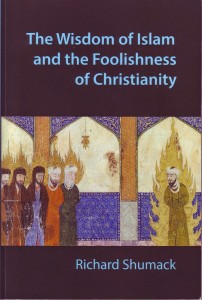The Wisdom of Islam and the Foolishness of Christianity
By Richard Shumack
Reviewed by Andrew Esnouf
Andrew was recently ordained as a deacon and is serving as Assistant Curate at St Andrew’s Brighton. He graduated from Ridley College and is pursuing further theological and philosophical study at the Australian Catholic University.
Apologetic dialogues and contributions often have a tendency to be high on rhetoric and caricatures, whilst simultaneously being low on clear thinking and generosity. Richard Shumack has sought to address this deficiency with his book ‘The Wisdom of Islam and the Foolishness of Christianity’, specifically with a focus of the philosophical dialogue between Islam and Christianity. This philosophical dialogue has been somewhat lacking to date, with both the Christian tendency to react in a knee jerk fashion to Islam and the general Muslim reluctance to reflect critically on their faith, a point admitted by Muslim philosopher and Shumack’s main dialogue partner Shabbir Akhtar. (p. 10) Each chapter of the work focusses on different areas of discussion, with the problems of certain belief, God’s hiddenness, human sin, the trinity, the incarnation, the cross, inspiration & revelation of sacred texts, divine ethics and political philosophy all given a robust examination.
The main contention of Shumack’s work is that Islam and Christianity operate under fundamentally different models of divine/human relations. The foundational understanding of Islam is that divine/human relations are legislative in nature, whereas the Christianity is understood in a fellowship model. (p. 14) He goes on to show throughout the book that the Christian fellowship model incorporates law but this is for the purpose of maintaining relationships, and that Christianity cannot be understood or rationally believed in if it is thought of in the legislative framework.
Shumack’s work is decidedly philosophical in its focus and approach, though this does not mean it is inaccessible. Shumack clarifies at the outset that this should not intimidate readers, reassuring that ‘philosophy is more about thinking carefully than thinking complicatedly‘, and that any ‘thoughtful person’ would be able to understand and enjoy this book. (p. 16) I can report with joy that this is certainly true, where difficult concepts arise there are clear explanations that are supplemented with helpful analogies. The discussion remains both thoroughly philosophical, the use of epistemology was particularly helpful, and remains accessible to the uninitiated, with the arguments for the incarnation titled ‘Coulda’, ‘Woulda’ and ‘Shoulda’. This balance is a real strength of the book.
Another strength of the book is the generosity that Shumack displays towards his interlocutors and integrity he upholds in presenting his own arguments. At every opportunity objections and objectors to the Christian faith were respectfully interacted with and presented at their strongest, without shying away from the tough questions such as the trinity and incarnation. For every philosophical delivery Akhtar bowled, Shumack played the ball and not the man. Special pleading from both the Bible and Quran is rejected at the outset to allow a genuine dialogue, this is not to say that Shumack does not believe in the authority of the Bible, he clearly does, only that his purpose is not preaching but rather apologetic dialogue. (pp. 20-21)
It is somewhat difficult to find any weaknesses other than the occasional editorial overlook, but it is important to note that this book is not the only resource you will need if you are engaging with Islam. Due to the philosophical focus of this book it does not tackle the common and important questions about textual criticism and historical reliability. The only other critique I would offer is that I found the important argument for a relational understanding of Christian theology could have been bolstered in its presentation, particularly in its discussion of justice and the atonement. (p. 141)
Shumack’s work is a strong contribution to the dialogue between Islam and Christianity and would be rewarding for anyone reading with an engaged mind who is interested in apologetics, but also for understanding the Muslim or Christian faiths. ‘The Wisdom of Islam and the Foolishness of Christianity’ is a worthy contender for the Australian Christian Book of the Year.